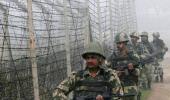The United States has said it will continue to press Pakistan to take "additional steps" to deal with terror groups seeking refuge within its borders, hours after Prime Minister Nawaz Sharif sought American help to resolve bilateral issues between India and Pakistan.

Sharif met US Secretary of State John Kerry on Monday and raised the issue of alleged human rights violations and killings in Kashmir.
Sharif's meeting with Kerry was among his first bilaterals in the city on the sidelines of the 71st session of the UN General Assembly and Kashmir featured prominently in the talks.
US State Department Deputy Spokesperson Mark Toner said at a press briefing just hours after the bilateral meeting between Kerry and Sharif that the US want to see more progress from Pakistan in dealing with the terror groups effectively.
Toner told reporters at the briefing at the New York Foreign Press Centre that US-Pakistan is "obviously a very important relationship.
"There's a lot on the bilateral agenda but also on the regional agenda," he said when asked about the Sharif-Kerry meeting.
He said the two sides are expected to discuss ongoing efforts by Pakistan at economic reform, "but certainly security will also be on the agenda, and we will continue to urge Pakistan to take additional steps to deal with all of the terrorist threats that it faces on its own territory but also those groups that -- frankly, that seek refuge or safe refuge within Pakistan's borders and how to deal with those groups in an effective way.
"We have seen some progress; we want to see more, and I think moving forward we will just continue to work closely and try to encourage greater counterterrorism cooperation with Pakistan but also within the region," Toner said.
According to a readout of the meeting by the Pakistan mission, Sharif said, "I still remember President (Bill) Clinton's promise that US will play its role to help out in resolving bilateral disputes and issues between Pakistan and India."
"I expect US administration and Secretary Kerry to use his good offices to help in resolving bilateral issues between Pakistan and India," he said.
In his meeting with British Prime Minister Theresa May, Sharif again raised the Kashmir issue and asked the British leader to play her role in convincing India to stop the use of force against the people in the region.
Sharif said Pakistan's support for Kashmiri people in their legitimate struggle for self determination and its commitment to the Kashmir cause are non-negotiable, according to information released by the Pakistani mission.
"We will not disappoint our Kashmiri brethren at any cost; we will keep on reminding the international community of its decades old commitments that have not been honored till today," he said.
Sharif said human rights violations and state oppression is at its peak in Kashmir and it is the duty of the international community to "ask India to immediately end state atrocities on innocent and defenceless Kashmiri people".
He said the people of Jammu & Kashmir must be allowed to chose their destiny and longstanding resolutions of the UNSC on the right to self determination of the Kashmiri people need to be implemented.
He added that "if the international community does not succeed in asking India to immediately end state oppression on the people in Jammu & Kashmir, India will be encouraged to increase the intensity of the continuing state atrocities."
Meanwhile, as a practice, Pakistan's officials do not allow Indian media to attend press briefings by Pakistan Foreign Secretary and other officials accompanying Sharif or any other events that they host.
In previous years too, Indian journalists have been asked by Pakistani officials to wait outside the briefing room while senior officials with the PM address their media.
Image: US Secretary of State John Kerry. Photograph: US Department of State/Twitter










